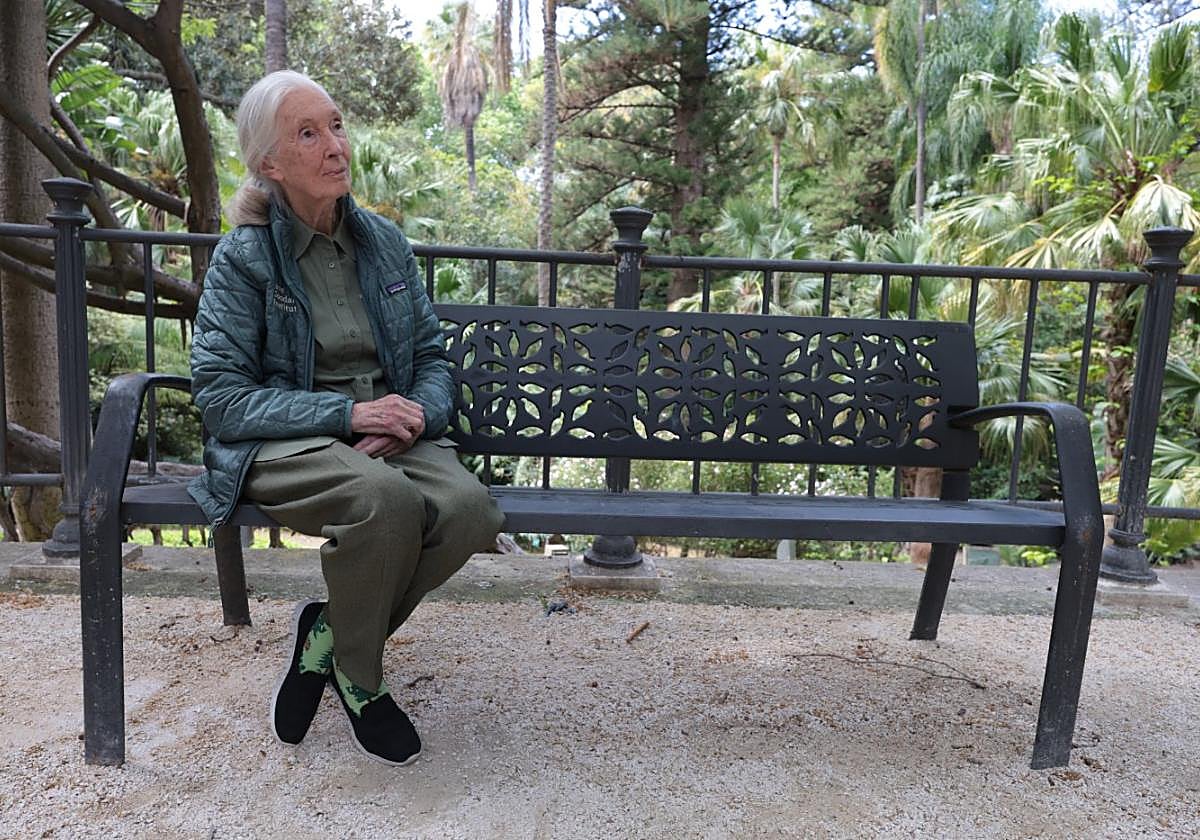Famous British green campaigner Jane Goodall brings her message of hope to Malaga
The animal conservationist and environmentalist came to the capital of the Costa del Sol to debut her film Reasons for Hope, highlighting the importance of caring for the planet
Juan Soto / Paco Griñán
Malaga
Friday, 9 May 2025, 11:40
Jane Goodall's inspiring message and life dedicated to animals and environmental conservation has won her the hearts of millions of people around the world. Many of her fans are in Malaga, where she premiered her new documentary Reasons for Hope on Thursday last week in the city's Albéniz theatre.
The general director of the Jane Goodall Institute, Federico Bogdanowicz, explained why Malaga was chosen for the premiere: "Malaga shows that it is following the same path as the foundation, working for sustainability." As its name suggests, the documentary displays real cases of success in conservation and hope for the environment. Goodall's documentary showcases the reintroduction of native species like the loon in Canada and the ibis in the Alps, alongside new creations like mechanical trees that trap CO2.
Goodall has received more than a hundred awards including the Prince of Asturias Award for Research and the Unesco Gold Medal. In 2002 she was even appointed United Nations Messenger of Peace. She explained that her "role is to get people to act because we all have a role to play in making the world more sustainable and more just". She still travels the globe at 91 years old to "raise awareness and give people hope".
Goodall came to the decision to devote her life to the cause after noticing that the environment was under siege while she was in Gombe (Tanzania). Her research on chimpanzees in Tanzania, among other things, taught her that they use tools in their daily life. This was a catalyst for devoting her life to animals, now leading initiatives to improve awareness of different species across the planet.
Nature is important
The premiere ended with a question-and-answer section. Audience members asked her about the impact of war and capitalism on the environment and about the importance of defending animals.
Goodall commented, "Surely we should do things differently because there cannot be infinite growth on a planet with finite resources and a constantly growing population". Nature is always important, even in the worst of times: "Wars are horrible, but if we don't take care of nature, it will be the end of us all," Goodall said.
A young woman asked a question from the crowd and Goodall asked her, "Can we finish with a hug?" Another example of how small gestures can contribute to making the world a better place.
Goodall spent three days exploring the city. After the screening of the documentary, she had an exclusive guided tour from the mayor of Malaga, Francisco de la Torre.
Interview with SUR
The animal activist also found time to speak to SUR about her thoughts on the city. The extent of Malaga's Phoenician history and its conservation surprised her. One of her highlights was the medieval wall under the University of Malaga building. But what impacted her the most was La Concepción botanical garden.
For the conservationist, accustomed to living among chimpanzees in Africa, this is Malaga's version of the rainforest. But it actually reminded her of somewhere else. In the interview, she said, "The blackbirds, the smell and the fragrances are spectacular and remind me of my home, in England."
However, Malaga wasn't all to her taste. She didn't appreciate the touristy horse carriages found in the city centre because of their "use of animals for transport". However, she did reference the regional government's new initiative to stop licences for animal transportation this year. She added "another thing that I hate are cruises" because of how much they pollute the environment. Despite how common cruise ships are in Mediterranean port towns and across the world, she "can't think of anything worse than going on one of those gigantic cruise ship".
Cities like Malaga have to aim for sustainable living, but it is also up to individuals to make a positive impact on the environment in their daily lives, she said. "Everyone can do their bit by not littering, saving electricity and water. Just thinking about what you do each day and trying to make the right choices for a better future."
Her conviction that "we have to spend more time in nature" is far from being just a slogan; it's how she has spent - and continues to spend - her entire life.
As her documentary spreads a positive message, so does she: "There is hope if we get together and do our bit."
